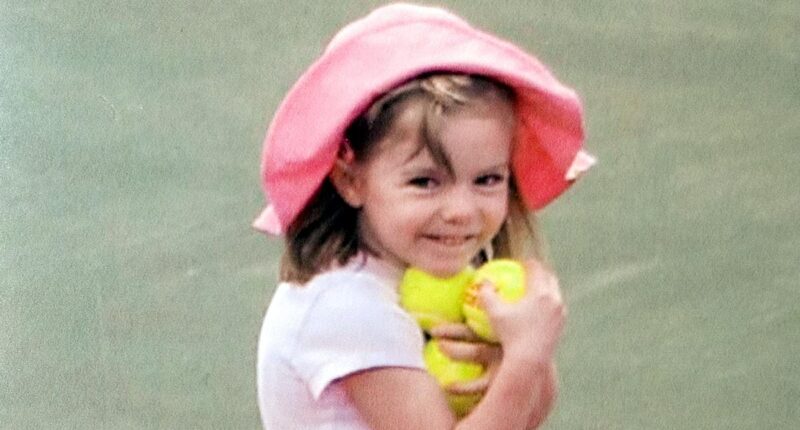This week, police officers wearing masks and armed with pickaxes, shovels, and even a mechanical digger were seen working through an abandoned area of land in Portugal.
Only a distinctive blue tent – the sort used in forensic searches – hinted at the troubling nature of their mission.
The neglected coastline was filled with rundown barns, roofless cottages, and scattered rubbish like old food wrappers and empty bottles, contrasting starkly with the well-maintained sunbeds and umbrellas of the nearby Praia de Luiz beach resort.
Praia da Luz gained notoriety as the place where three-year-old Madeleine McCann disappeared 18 years ago – and now, it is this neglected piece of land where some clues about her disappearance might potentially be found.
Watching from just a few feet away, I sensed an air of determination, desperation even, as German and Portuguese officers turned the soil and broke off sections of the crumbling buildings in a search that once again had the world transfixed.
At one point, a £20,000 ground-penetrating radar was brought in, capable of locating items buried as much as 15ft below the surface.
Finally, last night, officers packed up their equipment, folded the blue tent and embraced each other in farewell – and this latest search for Madeleine and what might have become of her drew to its conclusion. Let us hope it yields results.
Why such energy? And, crucially, why now, after all this time?

Madeleine McCann went missing in 2007 while on holiday with her family in Portugal
The answer is as simple as it is troubling: Christian Brueckner, overwhelmingly the most likely suspect for Madeleine’s abduction and probable murder, is about to leave jail in Germany, having served his time for the violent rape in 2005 of an elderly woman nearby on the Algarve, for which he was convicted in 2019, receiving a seven-year sentence.
And unless the German authorities can find a good reason to hold him in relation to Madeleine, they fear Brueckner might well slip from their grasp – destroying any chance of discovering the little girl’s fate.
Despite the millions of euros spent and the relentless global publicity, investigation after investigation into Madeleine’s disappearance has stalled or failed since the dreadful night in 2007 when she was abducted from the McCanns’ Ocean Club holiday apartment.
Years passed with few useful leads – and many thought the case had in effect been abandoned altogether, when, in June 2020, the German authorities came forward with a bombshell.
Prosecutors announced they had a prime suspect for the ‘abduction and murder’ of Madeleine McCann. He was Christian Brueckner, a convicted German paedophile and rapist.
His personal and criminal profiles fitted known facts. It had been established that Brueckner’s mobile phone had been located close to the Ocean Club the night Madeleine vanished.
Back then, Brueckner was living in a single-storey house on the outskirts of Praia da Luz. Crucially, his VW campervan was known to have been parked on this stretch of scrubland when Madeleine disappeared in 2007.
German police also had the powerful testimony of an informer called Helge Busching, a former friend of Brueckner who claimed the paedophile had ‘confessed’ to him a year after the three-year-old went missing.

Rapist and paedophile Christian Brueckner is the prime suspect in the disappearance
Most chillingly, according to Busching, Brueckner had said that it ‘was strange Maddie didn’t scream’ when he had abducted her.
Five years on from that shock announcement by the German authorities – and despite their belief that Brueckner is guilty – no charges have been brought.
Hence the dilemma facing the Germans. In three months’ time, 48-year-old Brueckner will be released from Sehnde prison outside Hanover.
It prompted this week’s frantic searches, which have involved a team of 30 officers from the BKA, the German equivalent of the FBI, joining their Portuguese counterparts at Atalaia, as this stretch of scrubland is known.
The rubbish-strewn, graffiti-covered buildings that have been at the heart of the investigators’ search are linked by a network of dusty tracks that join a footpath known in Portuguese as the Fisherman’s Trail.
Connecting Praia da Luz with the nearby town of Lagos, the track is popular with British holidaymakers. This week, however, tourists found their way blocked by blue and white police tape as detectives scoured the derelict buildings and two abandoned wells nearby – drained earlier by firemen.
Yesterday, as on previous days, I watched as officers used chainsaws and strimmers to cut back the dense foliage, exposing crumbling masonry and sandy earth, before getting to work with spades. A couple of Portuguese police officers had even slept in a van parked overnight to guard the site. Throughout the day, plastic boxes of soil and detritus were taken to the blue tent for further examination.
The Mail understands that the expensive ground-scanning radar was brought in not to look for a body but to see if items of clothing, perhaps Madeleine’s distinctive pink Eeyore pyjamas, had been buried there.

A distinctive blue tent hinted at the troubling nature of the search
Quite how material that has lain underground for more than 18 years could have survived is hard to imagine. When the Mail spoke to Portuguese police officers at the scene, they seemed less than optimistic. One officer rolled his eyes and shrugged his shoulders when asked what they hoped to find.
Yet ‘hope’ is surely the right word. After all, it was a quarter of a century ago that Brueckner first washed up here in his battered VW T3 Westfalia campervan.
He would earn a bit of extra cash from odd jobs in and around Praia da Luz and at the Ocean Club complex. It’s known, too, that Brueckner had form for breaking into rooms, stealing passports and valuables from the guests.
He was no mere petty thief. In addition to his 2019 conviction for the rape of 72-year-old American pensioner Diana Menkes in 2005, Brueckner has been accused of three more rapes and two indecent assaults in the area between December 2000 and June 2017, involving five women and girls. The oldest of his alleged victims was 80, the youngest aged just ten.
In 2019, one of the men who gave evidence against him for the rape of Diana Menkes was that informer, former roofer Helge Busching.
When Brueckner ‘confessed’ to him in 2008 while they were at a festival together in Spain, Busching says he contacted the McCanns’ private detective, Dave Edgar, to tip the family off – but heard nothing back.
Eventually, in 2017, Busching called Operation Grange, the taskforce set up by the Metropolitan Police to investigate Madeleine’s abduction.
Scotland Yard deemed Busching’s evidence of the greatest importance and questioned him at length that same year. Busching spent more than three days answering questions in an Athens hotel room.

Police have been searching various abandoned buildings
The information was passed to the German police, who then began looking into Brueckner in earnest. Soon – although tragically late given a decade had already passed since Madeleine’s disappearance – the pieces of a quite appalling jigsaw started falling into place.
Brueckner, of course, was already known to German police. They were aware of a hoard of thousands of vile images that officers had discovered in 2016 in a disused factory owned by Brueckner to the east of Hanover. There has even been a suggestion that one of the images unearthed in the factory might have been of Madeleine herself.
Children’s toys and clothes, including girls’ swimsuits, were also found, as well as photographs on hard drives, a laptop, USB sticks and memory cards, all hidden inside a Lidl bag and – in a final macabre touch – buried under the body of a dead dog that had belonged to the paedophile.
The sickening stash included messages swapped with other child abusers including a telling phrase: Brueckner revealed his dream was to ‘capture something small and use it for days’.
This week Busching spoke to the Daily Mail saying: ‘That man is evil. He’s bad and he deserves to stay behind bars.
‘I know he is capable of taking Madeleine and I told Scotland Yard and the German BKA the same thing. When he said “she didn’t scream” we were talking
our language, German, and I could tell from his voice and gestures what he meant. There is no misunderstanding.
‘I just pray to God that they find something to keep him in jail. The BKA wouldn’t spend all this money to send a team to Portugal if they didn’t think it was worth it.
‘They have to find something because time is running out. Brueckner could go free in September and, if he does, he will disappear and justice will not be done. There has to be some hope for Madeleine’s parents. I am convinced Brueckner is involved.’
This week Brueckner confirmed that he planned to leave Germany on his release, claiming that he was now better known than a ‘colourful dog’.
His legal team have already suggested he could move to the Far East or South America.
As prosecutor Hans Christian Wolters told the Mail: ‘We know we are running out of time and if he goes abroad, it will be difficult to charge him. We are convinced he is the man responsible, we just need time to build our case so that we can bring charges.
‘But even if he does go free, the case will go on. We will not stop investigating.’ The German public, too, is gripped. The popular tabloid Bild headlined its coverage: ‘It’s now or never.’
One possible chink of light for prosecutors is that Brueckner, 48, has outstanding fines from 2016 for forgery and motoring offences totalling 1,500 euros.
If they are not paid – and his legal team insist he is broke – then he will remain in jail until January 6.
Given his revolting record – his first conviction for child sex abuse was when he was just 17 – the authorities will hope to be granted a few extra months to investigate a man who has been described by a psychiatrist as being at ‘99 per cent on the scale of dangerousness’.
As yet another painstaking investigation comes to an end – and the Mail understands that little positive has been found so far – one can only imagine the fresh heartbreak each successive disappointment must have brought Kate and Gerry McCann.
Living quietly in the village of Rothley, Leicestershire, where they have brought up Madeleine’s twin siblings Amelie and Sean, 20, the McCanns have not commented publicly for years, preferring instead to post messages on the official Find Madeleine Campaign Facebook site.
Last month, on the 18th anniversary of her disappearance, Kate and Gerry wrote: ‘No matter how near or far she is, Madeleine continues to be right here with us every day.’
A few days later, on what would have been her 22nd birthday, they posted a montage of images and a haunting Enya song that includes the poignant line: ‘You’re missing, but you’re always a heartbeat from me.’
The McCanns must hope that, if nothing else, they might one day learn the truth. Perhaps it will finally emerge from this remote and eerie place.

















